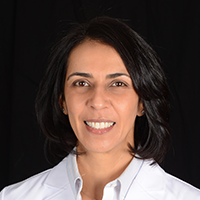Restorative Dentistry
Crowns and Bridges
Bridges are natural-looking dental appliances that can replace a section of missing teeth. Crowns are synthetic caps, usually made of a material like porcelain, placed on the top of a tooth.
DENTAL BRIDGES
Bridges are natural-looking dental appliances that can replace a section of missing teeth. Because they are custom-made, bridges are barely noticeable and can restore the natural contour of teeth as well as the proper bite relationship between upper and lower teeth.
Bridges are sometimes referred to as fixed partial dentures, because they are semi-permanent and are bonded to existing teeth or implants. Some bridges are removable and can be cleaned by the wearer; others need to be removed by a dentist. Porcelain, gold alloys or combinations of materials are usually used to make bridge appliances.
Appliances called implant bridges are attached to an area below the gum tissue, or the bone.
DENTAL CROWNS
Crowns are synthetic caps, usually made of a material like porcelain, placed on the top of a tooth. Crowns are typically used to restore a tooth’s function and appearance following a restorative procedure such as a root canal. When decay in a tooth has become so advanced that large portions of the tooth must be removed, crowns are often used to restore the tooth. Crowns are also used to attach bridges, cover implants, prevent a cracked tooth from becoming worse, or an existing filling is in jeopardy of becoming loose or dislocated. Crowns also serve an aesthetic use, and are applied when a discolored or stained tooth needs to be restored to its natural appearance.
PROCEDURES
A tooth must usually be reduced in size to accommodate a crown. An impression is made of the existing tooth and an impression is made. The impression is sent to a special lab, which manufactures a custom-designed crown. In some cases, a temporary crown is applied until the permanent crown is ready. Permanent crowns are cemented in place. Crowns are sometimes confused with veneers, but they are quite different. Veneers are typically applied only to relatively small areas.
CARING FOR YOUR CROWNS
With proper care, a good quality crown could last up to eight years or longer. It is very important to floss in the area of the crown to avoid excess plaque or collection of debris around the restoration. Certain behaviors such as jaw clenching or bruxism (teeth grinding) significantly shorten the life of a crown. Moreover, eating brittle foods, ice or hard candy can compromise the adhesion of the crown, or even damage the crown.
Dentures & Partials
Having teeth to properly chew and digest food is very important to your overall health condition. If you are missing teeth and would like to have a better quality of life when it comes to eating then ask us how we can give you what you want. Westwood Dental Partners makes dentures and partial dentures so that they are virtually invisible.
REMOVABLE DENTAL PROSTHESIS
If you’ve lost all of your natural teeth and live in Boston – Charlestown – Chelsea or East Boston, MA, whether from periodontal disease, tooth decay or injury, complete dentures from Westwood Dental Partners dentists can replace your missing teeth and your smile. Replacing missing teeth will benefit your appearance and your health. Without support from the denture, facial muscles sag, making a person look older. You’ll be able to eat and speak—things that people often take for granted until their natural teeth are lost.
There are various types of complete dentures. A conventional full denture is made and placed in the patient’s mouth after the remaining teeth are removed and tissues have healed which may take several months. An immediate complete denture is inserted as soon as the remaining teeth are removed. The dentist takes measurements and makes models of the patient’s jaws during a preliminary visit. With immediate dentures, the denture wearer does not have to be without teeth during the healing period.
Even if you wear full dentures and live in Boston – Charlestown – Chelsea or East Boston, MA, you still must take good care of your mouth. Brush your gums, tongue and palate every morning with a soft-bristled brush before you insert your dentures to stimulate circulation in your tissues and help remove plaque.
Neda Shah-Hosseini
PROSTHODONTIST*
DMD from Harvard University - Cum Laude
Prosthodontic Residency at Boston University
Harvard Faculty since 1996
Gold Medal - Faculty Award from Harvard School of Dental Medicine
Faheem Rasool
Prosthodontist*
DMD and Prosthodontic Residency at Harvard University
Harvard Faculty since 1996
Masters of Medical Sciences in Oral Biology
Former Head of Division of Prosthodontics - Harvard School of Dental Medicine
Alexander Rabkin
General Dentist
Dr. Rabkin received Bachelor of Science (Cum Laude) in Neuroscience from the University of Massachusetts at Amherst.
Received DMD at the University of Connecticut School of Dental Medicine.
General practice residency at Hartford Hospital.
Dr. Rabkin is a member of the American Dental Association, the Massachusetts Dental Society, and the American Academy of Cosmetic Dentistry.
*-A prosthodontist is a dentist who specializes in the esthetic restoration
and replacement of teeth. Prosthodontists receive two or three years
of additional training after dental school, and restore optimum
appearance and function to your smile.
Insurances We Accept:
Delta Dental
Blue Cross
Blue Shield




